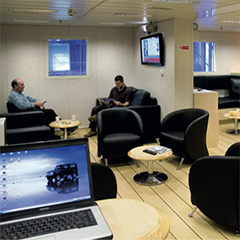When it comes to sourcing an accommodation solution, which meets the requirements of all stakeholders in a renewable energy operation, the most successful approach is to work with an experienced partner. With wind farms increasingly being planned further from shore, daily transfers of technicians and crew members via vessels are becoming a thing of the past. And as more jobs are being created within the offshore wind energy sector to support siting, erecting, maintaining, servicing and possibly dismantling turbines, the need to retain highly skilled crew members is essential.
Accommodating the crew at sea using temporary living quarters saves valuable time and offers a solution which safeguards the personal wellbeing of the crew in an environment often characterized by harsh conditions.
Providing safe, high-quality accommodation with increased cabin space is a key factor in the wellbeing of the crew, who are involved in the vast activities of the construction and commissioning phases and beyond. Wind farm managers nearly always have to work to tight weather-dependent timescales and budgets. Wind farm managers are becoming equally as concerned with sustaining morale amongst their crew and want to ensure adequate space and reasonable privacy. After all, the rate at which the offshore wind energy sector is expanding has the potential to lead to skills gaps, and it’s becoming more imperative than ever for wind farm managers to take increased measures to retain their skilled workforce, by extending the comforts of home out at sea.
When it comes to making remote accommodation appealing, whether short or long-term, privacy is of critical importance to the wellbeing of personnel, who work in any offshore environment. Good personal living conditions should be self-evident in the design and manufacturing of any unit. Cabins should be thoughtfully designed, with space that exceeds room volumes and requirements as outlined in the ‘Guidance for the provision of Accommodation Offshore’. These guidelines specify that rooms should provide at least a minimum of 11 cubic metres per person, and a requirement for reasonable privacy, through no more than two persons sharing a cabin during any 24-hour shift period.



























